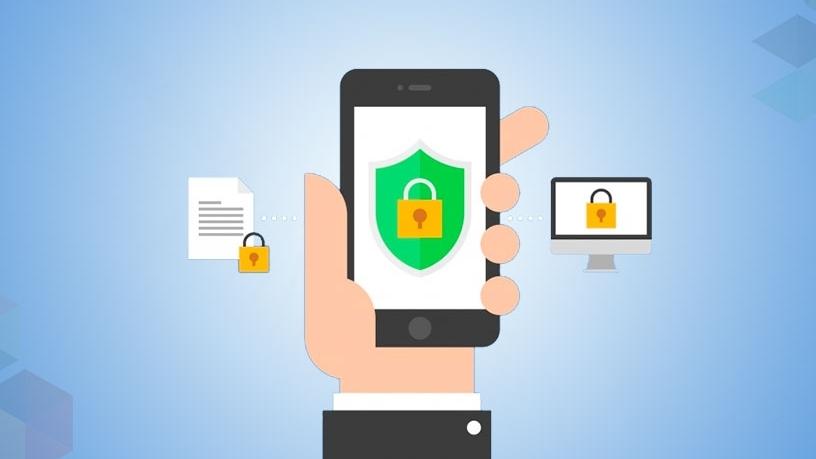
Since first hitting the market in 1973, mobile phones have come a long way. Mobile technology first emerged as brick-sized cellular phones, which developed over the years into the slim and powerful smartphones many of us can't seem to live without today.
Mobile technology has a lot to offer, but it also comes with security risks. Mobile devices often store a lot of information belonging to both consumers and enterprise employees, which hackers often try to get their hands on.
Rather than taking over a desktop or laptop by bypassing firewalls and other security layers, hackers can more easily breach mobile devices and steal sensitive data, which highlights the importance of securing mobile devices.
Security risks for mobile devices
Security threats impact mobile devices much like they impact desktops. Threats like ransomware, malware, Trojans and worms can be deployed with different motives to target Android or iOS devices. With the amount of data that flows through mobile devices every minute, there's a good chance these devices could fall victim to one of the many traps set by hackers.
For example, even something as seemingly harmless as a photo editing app from an unknown third-party site can unintentionally give hackers root privileges. The recent RAMpage attack on Android devices is a good example of how widespread mobile security breaches can be. But securing mobile devices requires a fair amount of attention and care, and for enterprises that have hundreds of mobile devices, securing all of them can be both challenging and time-consuming.
Challenges in managing mobile devices
Enterprises are embracing the mobile workforce culture, allowing employees to work from anywhere as long as they can connect to the Internet. However, these remote employees often carry corporate devices with them, which, when exposed to public networks, can also expose these devices to man-in-the-middle attacks and other security risks involved in connecting to public networks. On the other side of that, employees usually bring their own devices to work, sometimes connecting to the corporate network without following proper security policies.
Bring your own device (BYOD) management is more complicated than managing corporate-owned devices, as personal devices include employees' personal data as well. IT administrators need to be able to handle personal data separately from corporate data.
"Enterprises compiled of different types of mobile devices that run on different platforms, handling their personal and corporate data separately, is in demand, as POPI (Protection of Personal Information Act) is coming into force in South Africa soon," says Regardt Wolmarans, head of technical support for MDM at ITR Technology.
If a device is lost or stolen, it's not the cost of replacing the device that raises a major concern, it's the data on the missing device you need to worry about. Cyber attacks continue to evolve, with more sophisticated attacks and better success rates against Android and iOS devices. A compromised device can be used to perform DDOS attacks to breach into an enterprise network without the device owner even realising what's happening. Adding to the chaos are application vulnerabilities, which leave back doors to your network open for attackers.
Mobile device management makes the difference
With all the threats surrounding mobile devices, IT administrators need the right tool to deliver better visibility and control over mobile devices, all from a central location. Mobile Device Manager Plus is the tool that every IT administrator needs for dealing with unforeseen mobile security requirements and enhancing data security management on mobile devices.
Using Mobile Device Manager Plus, IT administrators can manage personal and corporate data separately with complete visibility. Corporate data, like documents and e-mails, can be kept confidential with predefined security policies that allow employees to only open them with Mobile Device Manager Plus.
Mobile Device Manager Plus simplifies the app distribution process by letting IT administrators blacklist and white list apps, so users will only be allowed to add approved apps to their corporate devices. As far as lost devices go, admins can locate these devices using GPS tracking and can remotely wipe corporate data to make sure no data breaches occur on this device while it's unattended.
"Managing apps and devices is an exhausting routine. With end-to-end device management and data security capabilities, ManageEngine Mobile Device Manager Plus is already making things easier for our clients," concluded Wolmarans. There's no telling what threats the future holds for user privacy and data security, but with these kinds of device security solutions in place, there's still hope for successful mobile device security after all.
Share
ITR Technology
ITR Technology originated as a trading company from MarbriTech Distribution, established in 1999 as a connectivity, printer accounting and secure printing specialist. In 2001, ITR Technology partnered with ManageEngine as a distributor for the region. The various solutions offered by the company include full infrastructure monitoring and management, life cycle management and configuration management capabilities, which allow clients to make use of ITR Technology as a one-stop shop to obtain a proactive approach and increased quality of service and uptime to their IT environments and organisations.
Editorial contacts